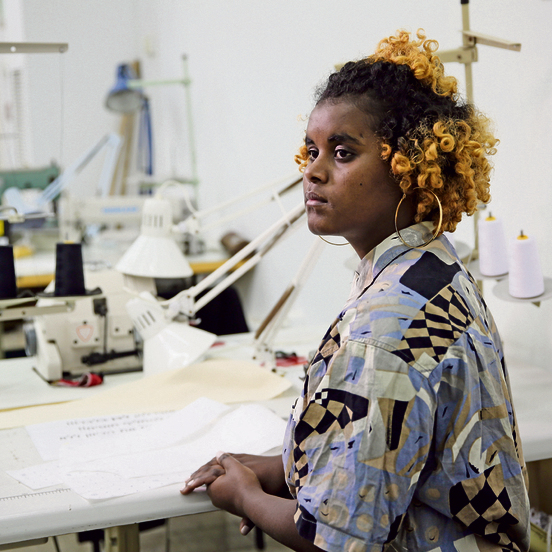

Deportation of African migrants 'a death sentence for me'
Kasanash Yashna came to Israel as a teenager, completed her matriculation exams and now studies at the Bezalel Academy, but her 'whole world collapsed' when she was informed she had 14 days to leave Israel as part of deportation plan for illegal African migrants; Authorities say she was invited for an interview for asylum application.
Born in the northern Ethiopian city of of Gonder, Kasanash was horrified when she was informed by Israeli authorities that the wave of deportation set to sweep thousands of illegal migrants out of country would take her with it.
At the beginning of January, Israel notified thousands of Africans who entered the country illegally that they have three months to leave or face incarceration.
The Population and Immigration Authority called on migrants from Sudan and Eritrea to leave "to their country or to a third country," meaning Rwanda or Uganda. Those who leave by the end of March will be given $3,500, along with airfare and other incentives.
No stranger to hardship and overcoming challenges, Kasanash is nevertheless worried Israel is about to force her to leave for a country where she will be forced to contend with more tribulations and more encroachments on her right.
“I met for the first time the parents of my future husband when I was six,” Kasanash said, “when they opened a school in the village I asked to study. My father told me that I can’t because I’m engaged.”
Determined to learn, Kasanash began her own private study. “When my father found out he got really angry. I escaped to my grandparents because I was sick of being beaten and I met my aunt there. We traveled together to Khartoum, Sudan,” she explained.
But life with her aunt in Sudan was not much better than in her village. “I would serve in her house. One day she decided to escape. We got to the desert and she sold me to Bedouin. From Sudan to Egypt, they raped one of the travelers before my very eyes,” she recalled.
In February 2008, when she was 14, the terrorizing journey ended and Kasanash arrived in Israel where she enrolled in studies at the Kadoorie Youth Village and completed her matriculation exams.
Today, she is a student of fashion design at the Bezalel Academy of Arts and Design in Jerusalem.
In November last year, she was notified by the Population and Immigration Authority that she had 14 days to leave Israel.
“I felt like my whole life was collapsing. I feel Israeli despite the fact that sometimes I am made to not feel that way,” she said.
Nine years ago, Kasanash applied for asylum in Israel but has never received a final answer.
“If they expel me, it is a death sentence for me. It will feel as though I am being sold again to another state. I ask the State of Israel: Give me the right to live like a normal person,” she said in an impassioned and desperate plea.
Roi Bar Illan, the manager of the Kadoorie Youth Village in the Lower Galilee describe her case as “heartbreaking,” adding that “as an educator in Israel I feel a moral obligation to turn to the decision makers to get the decree rescinded.”
Despite Kasanash story, the Population and Immigration Authority insists that she was given every opportunity to settle the status of her pending asylum application.
“This is a an Ethiopian subject who requested asylum. She was invited for an interview to deal with the request last July but she didn’t show up,” a statement read.
“Despite attempts made to reach her she didn’t come and therefore her case was closed. Therefore, she was informed a month ago that she had to leave Israel.”
Some Israelis have backed the government's policy to rid the country of illegal migrants. Moreover, Prime Minister Benjamin Netanyahu has insisted that the deportations will only apply to illegal economic migrants and genuine asylum seekers fleeing persecution will be considered separately, but a sense of uneasiness has nudged activists into action.
In addition to protests against the policy, some activists are considering adopting a new strategy that would involve marrying them to block the government from carrying out the program.
Earlier this week, thirty-six Holocaust survivors penned an open letter to Netanyahu in which they urged him to abort the planned expulsion to Rwanda.

















